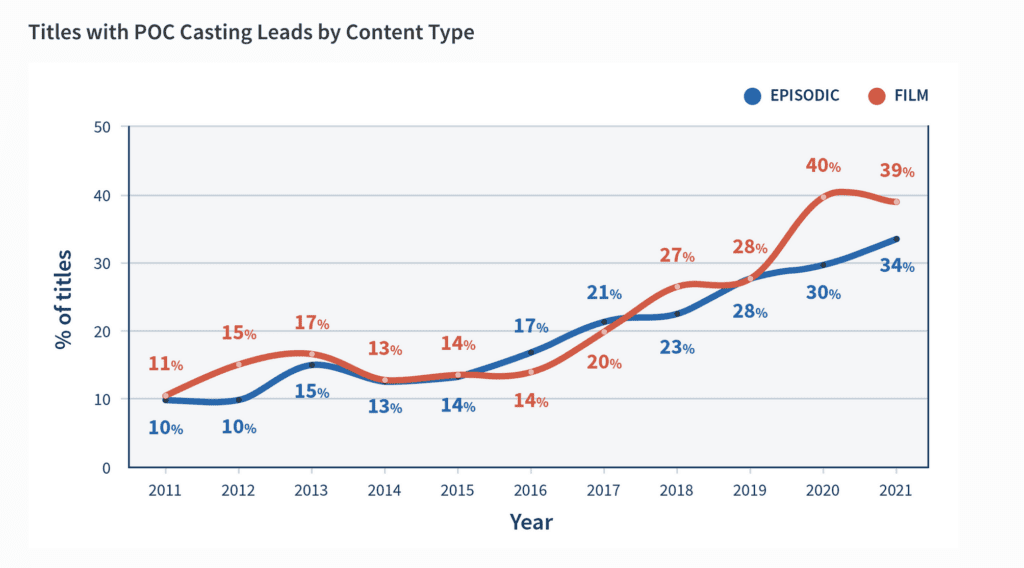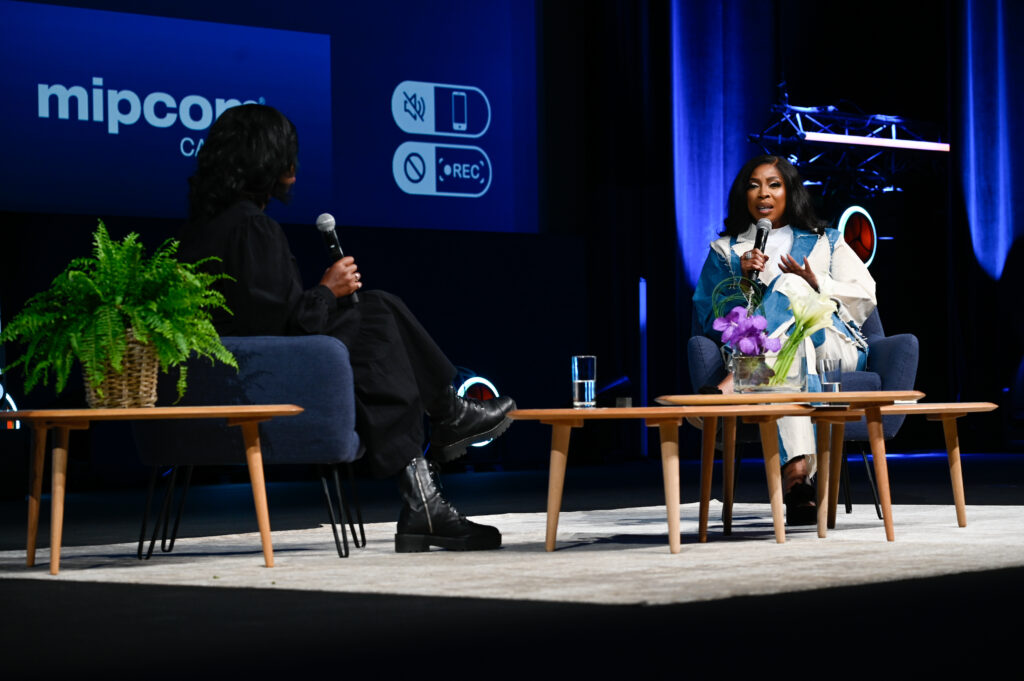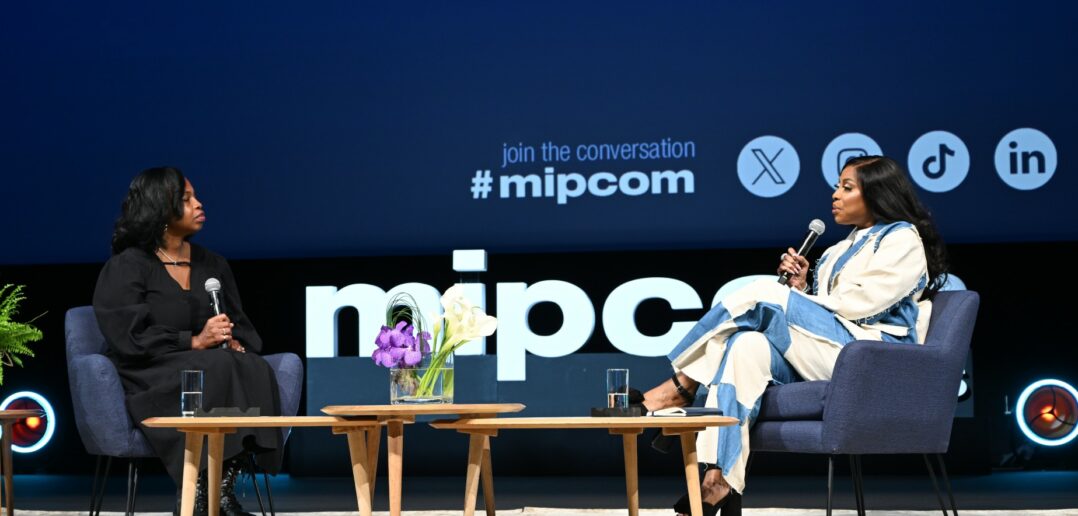Progress in media representation remains insufficient
Media representation refers to the way the media industry portrays particular groups, communities and experiences. This encompasses how different characteristics such as race, gender, age, sexuality, ethnicity, religion, and socio-economic status are depicted. The concept is crucial in understanding how the media shapes public perception, attitudes, and beliefs.
Strides have undoubtedly been made in television to increase diversity and inclusion. In fact, in just a few years, progress in terms of the media representation of diversity in terms of gender, sexual orientation, ethnicity or neurodiversity has been impressive, with the presence of main characters (and not just supporting roles) from all backgrounds seeming to have become a given. According to UCLA’s 2023 Hollywood TV report, main cast representation for people of color on television in the USA achieved parity for the first time in the 2021-2022 season, for example.

So there is progress on the screen. But to many, that progress in media representation is still insufficient (the same UCLA study finds that Latinx and Asian people remain widely underrepresented) and the reason for that is of course to be found behind the scenes, in the C-suites of media companies where commissioning decisions are made and where diversity is still, more often than not, lacking.
« The representation just isn’t there »
That is, in essence, the assessment made by Mo Abudu, the CEO of Nigerian media conglomerate EbonyLife Media, during her keynote address at MIPCOM Cannes in October 2023. Abudu is a producer, entrepreneur, broadcaster, and former TV host – she was described by MIP markets director Lucy Smith as « a powerhouse ». Her company is one of Africa’s largest studios, it produced the first pan African talk show and was the first African media company to sign a multiple project deal with Netflix.

As such, she has a lot to say about the representation of Black and African perspectives, or lack thereof, in the entertainment industry today. « I continue to see very little on television that speaks to me as a woman of colour, » she commented at the beginning of her keynote. Acknowledging that the media industry has recognised the necessity to evolve with the times and start offering different perspectives, Abudu nevertheless said she feels a lot more needs to be done in that direction for better representation. « Probably every media company has a diversity & inclusion department or officer, and one wonders why, because the representation just isn’t there. »
Not one to mince her words, the Anglo-Nigerian entrepreneur went on to state that in their vast majority, industry leaders still aren’t truly committed to making a change in the content they produce, thus keeping in place, willingly or not, the traditional stereotypes we are used to seeing on our screens. « There has to be sincerity and purpose when setting up these departments; what are they there for? We’re just doing it because we feel we should do something, » she pointed out.
In many ways, Adbudu’s words echoed a sentiment often voiced by members of the entertainment community from minority backgrounds: that despite evolutions, the fact of being anything but a white, heterosexual male still sets you apart in the media industry, whether on the screen or behind the scenes. Kerry Washington, the star of Shonda Rhimes’ ABC hit show Scandal, embodied that sentiment by saying « I don’t decide to play the characters I play as political choice, yet the characters I play often become political statements. Having your story told as a woman, as a person of colour, as a lesbian or as a trans person, as any member of any disenfranchised community, it is sadly often still seen as a radical idea. »
The high barrier of media commissioners
So what must be done to push things forward? From Mo Abudu’s perspective, when trying to push African productions onto the global media stage, the biggest hurdle to overcome is a quite straightforward one: budgets. Talking about EbonyLife’s shows, which are often highly successful across Africa, and sometimes in other markets such as the UK, but remain ‘local’ in terms of the scale of the budgets they are produced with, « imagine what we would be doing with global numbers, » she said. « We do the best we can with the resources we have, but it’s not to say that there aren’t bigger stories we want to be able to tell. That is the frustration: we aren’t able to tell those, with a bigger writer, more expensive talent, etc. All the things that attract audiences to a show are often determined by the budget that the show is given. In order to be able to compete effectively with the rest of what’s being told around the world, you need to allocate decent budgets, and I’m not quite sure we’re seeing that at the moment. »
Which brings us back to square one: the reason why higher budgets aren’t sufficiently allocated to diverse content, because media commissioners often don’t realise their relevance or believe in their potential success. « When you speak to commissioners and gatekeepers, at times it’s almost as if they’ve got a ready list of responses as to why they’re not going to make your show, » Abudu regretted.
The underlying reason for this is no mystery. Like in so many other sectors, decision-makers in the entertainment industry still predominantly share the same cultural, generational and ethnic background. « A middle-aged white man has a view on what he wants to commission, » explained Abudu. « I think we need to have commissioners of all ages, all complexions, and all genders so that there is a great mix in what eventually makes it onto our screens. As long as we always have the same people commissioning, storytelling is not going to change. »
And in the meantime, the main obstacle to that change is the overall risk-averse nature of the media industry, with commissioners often unsure about going for something originating in Black or African culture, for example. « They would rather just tell something that’s similar to what they have always been used to. The biggest challenge is actually getting through to the gatekeepers, and they’ve decided that people like me shouldn’t necessarily be represented on television, that my stories aren’t worthy of being told. » And this realisation is all the more frustrating for Abudu when turns on her TV, she said: « Sometimes I tell myself ‘I have stories that are better than this’. There are so many amazing ones to tell that come from Africa. »
Better media representation: not a charity case
But of course, there is hope for change. Leading streamers such as Netflix have moved into Africa and started making shows specifically catered for local audiences, and some of those travel around the world. Abudu cites the example of Nigerian crime thriller The Black Book. With its $1 million dollar budget, it was the most expensive movie ever made in Nollywood, and its 20 million views lead it to hit No. 3 on Netflix’s 2023 global chart. An example that beautifully proves her earlier point that with adequate means, productions emanating from outside of Western culture can find international success, thus shoring up representation. Abudu cited as additional proof the 2021 smash hit series Squid Game and the slew of globally successful titles from Korea that followed suit, and predicted that « African content is about to do the same ».
Making a business case for giving Black and African productions more of a chance in order to reach better representation in the global entertainment and media landscape, she added that this « is not a charity case. « There are 1.4 billion people living in Africa right now. We have the youngest population on the planet, and they want to see content that speaks to them. So there is a market there. »
Beyond that, setting aside the matter of diversity and representation to touch upon the universal, the EbonyLife CEO added a comment about the fact that at the end of the day, « a great story is a great story, » regardless of its culture of origin. « The important thing is how authentic you are when you’re telling it. » And going back to African storytelling, she indicated that « we have the same dreams, aspirations and desires as everyone else around the world, so I definitely think they can travel, if only they are actually made so that they can travel. »
Lastly, when asked if she had a word of advice for people with a comparable background to hers who are looking to get into this industry, Abudu responded: « I say to every African woman that you have to work three times harder, because it’s the truth. But it’s not a disadvantage, because when I’m out there trying to make a case for something, I’m better prepared because I’ve actually put the work in. »
The 8th edition of the MIPCOM CANNES Diversify TV Awards will take place on Tuesday 22 October 2024. If you want to enter the competition, hurry up and submit your project here before July 19. Get your pass now to join us at MIPCOM CANNES !

